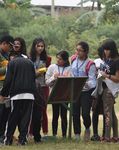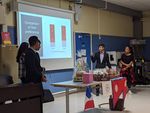Nisarga Batika School - High School* at Ushering a new era of learning
←
→
Page content transcription
If your browser does not render page correctly, please read the page content below
Take the first steps of your
adult life at Nisarga
Nisarga Batika’s High School continues
learners’ journey into experiential
learning in Grades 11 and 12, before We inspire young
they enter the larger world of university minds to discover
education and a life of career the joy of learning
through their own
experiences.
We encourage
learners towards
critical thinking,
self discovery and
creativity.
We prepare
conscious,
independent and
responsible citizens.At Nisarga, learners are motivated to learn when they are challenged to solve real problems. When students pursue answers to questions of interest to them and apply their learning to something they care about, they are more likely to remember what they have learned than if they are taught skills out of context. No matter what we teach, we look for ways to build on students’ interests and help them see the relevance of their learning to everyday life. While offering an environment for students to acquire knowledge, importance will be given to: • Setting clear and precise goals for the knowledge and skills that the students are expected to acquire • Communicating these goals to the students and ensuring that they are understood • Organising assignments in a clearly planned sequence • Providing guidance for the students
Integrated Curriculum Teacher Development
Do children use math skills
Nisarga integrates its curriculum and Teachers at Nisarga’s High School
as they work on science or
plans its activities to enable students are facilitators, guiding students to
social studies project?
to gain knowledge and apply skills achieve to the best of their abilities.
across many disciplines. As students in At the beginning of every academic
During math and science
any classroom are at different stages year, Nisarga teachers go through an
lessons do children read,
in the learning process, integrated intensive training. Regular guidance
write and discuss?
learning experiences offer a wide and workshops take place for teachers
range of possibilities for growth and throughout the year on collaborative
Are children using
meaning-making. planning, reflection, peer-learning and
dramatics and art
group-learning, brainstorming and
By letting students work in pairs, small to represent their
sharing of ideas.
groups, one-on-one conferences, or interpretations of literature
group meetings, teachers demonstrate or what they are discussing
respect for children’s individual in social studies?
preferences and learn more about what
each student knows.
Parents’ Involvement
The growth of children into emotionally
and socially mature, sensible and
responsible adults is impossible
without the combined efforts of
educators and the parent community.
Children’s school education can
become complete only with the
participation of parents. We see
School Meals
parents as the school’s partners in
the process of preparing children to Nisarga provides well-balanced
become sensible adults. Orientation nutritious lunch. Our meals are carefully
programmes, conferences, events planned, hygienically prepared and
and festivals help engage parents in recommended by a dietician. Our
children’s learning and share equal School Chef and the kitchen staff
responsibility for their child’s growth are well-trained in housekeeping and
and development. kitchen management.Beyond the Curriculum 5. Adventure course once a year: Each
student will participate in at least one
Education extends beyond academics. adventure course either in Grade 11 or
Students at Nisarga will get ample 12, or both. The adventure course will
opportunity for learning how to develop life skills related to physical
collaborate, communicate, relate strength, collaboration and problem
to each other and solve their own solving.
problems outside of curricular work.
6. Life skills workshops: Life skills are
1. Exchange programme at La Salle St. required for students to eventually
Christoph School, France: Collaborate become successful and happy adults.
with the school in France for a month/6 The WHO has identified five basic
months/a year long study abroad areas of life skills relevant across
programme for interested students. cultures which Nisarga aims to provide
2. Subject-related day trips: Students to its high school students:
will learn through first-hand experience
A Nisarga student • Self-awareness and empathy
of the places and things related to the
embodies… topics of study. • Decision making and problem
solving
3. Student-led individualised
self-respect project: Each student will work on • Creative thinking and critical
compassion an independent project related to thinking
kindness the subject/s they have chosen. • Communication & interpersonal
responsibility They will learn the skills of collecting, skills
synthesising data and preparing a
courage • Coping with emotions and coping
report and presenting their findings in
honesty a creative form of their choice. with stress
humility
4. Student-led community service:
acceptance Students will raise funds and involve
curiosity themselves in providing basic facilities
to underprivileged communities.
Nurturing a culture
of excellence10. Career/college counselling: A
professional guidance counsellor will
advise students on ways to choose a
college within or outside the country
based on their needs and desires.
11. Interactions with experts: Experts
from various fields will be invited on a
regular basis to share their professional
and personal journeys.
12. Visiting faculty: In order to
strengthen students’ learning, visiting
faculty members will be invited as per
each subject’s requirements.
7. Voluntary service within school:
Students will take responsibility
of teaching younger students of
elementary grades skills such as
fund raising, charity, video making,
photography, grooming elementary
students for and presenting
performances, organising and
conducting various programmes.
8. Optional ECA activities: Each
student will sustain their learning in any
one of the following sports: swimming,
basketball and futsal.
9. Clubs: Students will have an array
of clubs — including foreign language
classes, art and design, environment,
music, etc — that they can be a part of
throughout the two years.Facilities
Digitally equipped
classrooms to integrate ICT
in education
Extensive sports
programmes with Beyond
the Curriculum activities
Highly qualified faculty
members
13. Internship: Students will be sent to 18. Coffee lounge: Students from the
In-campus swimming pools
relevant institutions and organisations management stream will manage a coffee with certified trainers
to work as short-term interns during lounge. This will be a group project.
Library with a rich collection
their academic breaks.
19. Duke of Edinburgh Award: This is of books and reference
15. Conferences and simulations: an optional programme for learning materials
Students will participate in simulated various life skills. For receiving an award
programmes of the United Nations, from the Duke of Edinburgh, students Positive campus climate
International Criminal Court and the need to complete the required number that fosters a sense of
Nepali Parliament to deepen their of hours for student-chosen activities. community
understanding of the world around them. Award leaders will be appointed and
trained for mentoring and guiding them. Safe, comfortable and
16. Fundraising theatre production:
chaperoned transportation
Every two years, High School students 20. Counselling: The psychological
will take the lead in planning and counsellor will deliver regular Small class size with ideal
executing an entire theatre production. counselling sessions for healthy student-teacher ratio
emotional development of students.
17. Nisarga Ramailo: Students will Spacious campus with
The counsellor will also be available for
organise a fundraising event with support
individual sessions. abundant play and
from parents and the school. Funds raised
will be used for a social purpose decided * These activities are subject to change recreational area
according to the situation and the number of
by the students as a team. students.Subject Choice
Grade 11 students will be assisted in choosing subjects from a range of offerings
based on their interests, their strengths and their future prospects.
Subjects Credit Hours
Grade XI Grade XII
Nepali 3 3
English 4 4
Social Studies 5 -
Life skills education - 5
Optional I 5 5
Optional II 5 5
Optional III 5 5
Total Credits 27 27
Optional IV 5 5
Students are required to select three subjects from the four optional subject
groups. Additionally, they can opt for another subject from the remaining subject
group to earn extra credits.
Group 1 Group 2 Group 3 Group 4
Physics Biology Chemistry Mathematics
Accounting Business Studies Economics Business
Mathematics
Rural Computer Science Marketing Environment
Development Science
Sociology Optional English Rabi Bhawan
Mass Kathmandu, 44614
Communication 014275193 / 014289545
014274890 / 014274772
Students must opt for the same subjects in both Grade XI and Grade XII.
mail@nisarga.edu.np
www.nisarga.edu.npYou can also read



























































